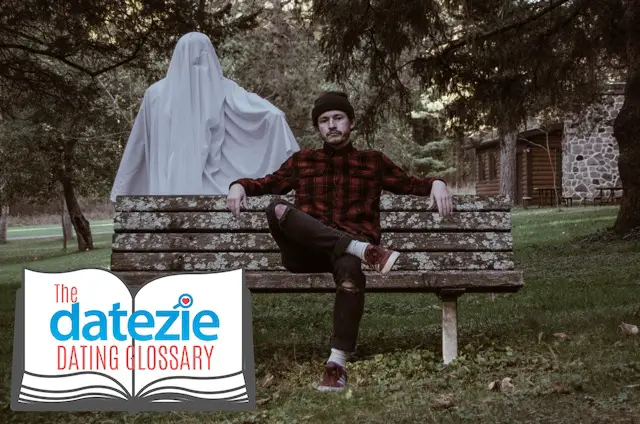(Last Updated on June 20, 2019 by Datezie Editors)
As dating has evolved to a much more digital landscape, a slew of new words and trends have emerged, requiring singles to brush up on their knowledge before diving in. To ensure you’re up to date and ready to tackle the ever-changing vocabulary, reference Datezie’s Dating Glossary. Our collection defines, explains—and offers humor and strategy—to the new ABC’s of falling in love.
TLDR: Ghosting: when someone you’re romantically interested in completely disappears without warning or communication.
You swipe right. You match. You start a witty banter. You go out on a Tuesday for happy hour for a drink. That leads to four rounds. By Sunday, you’ve been on three magical dates. A month later, you’re completely smitten. Six weeks later, all seems to be going swimmingly… when suddenly, your not-quite-boyfriend-or-girlfriend doesn’t respond to your text messages as quickly. A handful of afternoons later, you start to panic. You call. You message. You send carrier pigeons. You wonder if something terrible happened to them. You go through the stages of grief—and finally, say, a year later, you finally hear from them. Almost as if they were resurrected from the dead, just as you started to move on. While plenty of people have randomly experienced cold feet at the start of a relationship, it has only been in recent years that it has earned a term in modern dating. If you’ve done this to someone (shame on you!), or you’ve experienced this type of grief, here’s what you need to know about ghosting.
What is Ghosting?
Whether it was your last-minute Halloween costume or you’re a fan of Casper or Supernatural, most folks know what a ghost is. Transparent, silent, mysterious and sometimes, scary, you can’t see this type of creature, but they’re there. They linger. And thus, is where ‘ghosting’ can start to be defined. As licensed marriage and family therapist Kristen Routh, MS, LMFT explains, ghosting in a relationship is when a person starts to withdraw by intentionally decreasing communication and interaction, without telling the other person. Eventually, they become completely unresponsive, leaving the person on the other end haunted by the memory and filled with angst.
While it most often relates to a courtship that wasn’t made official quite yet but had legs, it can also refer to those three-date wonders who disappear out of nowhere. Or even, in some extreme cases, a long-term relationship or marriage where one person walks away without notice or providing a reason.
Where Did ‘Ghosting’ Come From
To put it mildly—people have been jerks forever. But Routh says a emergence of this behavior may be credited to a tech-driven age of communication and dating, where it is far easier to ‘ghost’ rather than take responsibility for telling another person directly that you just aren’t that interested in them. While there are mentions of ‘ghosting’ in 2011, the credit for the term itself might be due to actress Charlize Theron. Routh explains during an interview, she shared she ‘slowly’ stopped dating Sean Penn by ignoring his calls and text messages. She continued to share that while she was once a staple in Sean Penn’s life, she purposefully drifted away or ‘became a ghost.’ “Since then, everyday people are using ghosting as a verb to explain the actions of someone purposefully disappearing from your life after once being present and purposeful,” Routh says.
Why Ghosting Matters
Of all the horrors of dating, having someone withdraw from you when you trusted them with more than your body, but with your heart is arguably the most painful. In fact, dating expert and founder of CupidsPulse Lori Bizzoco shares ghosting can leave a serious psychological impact. “It can make it difficult to maintain a future relationship. People are wired to expect social cues to determine how they will subsequently behave, so when a person is ghosted without forewarning, it can leave them feeling out of control and rejected, which in turn may have an effect on how they manage other relationships due to trust issues,” she explains.
Of course, no one wants to experience this type of rejection or heartbreak, so Bizzoco encourages singles to recognize when they’ve been ghosted, rather than holding onto false hope. “Often times we make up excuses when someone we are seeing all of a sudden vanishes. We tell ourselves that something must have happened to them or they lost their phone, and that is rarely ever the case,” she explains.
If you are tempted to be the bad guy in this situation and leave someone wondering what in the world happened to you—remember, you won’t get off the emotional hook that easily. As Roth shares, “Ghosting can leave the ghoster feeling guilty and anxious, not certain if they will run into the person they ghosted and have to explain their reasons for disappearing from communication.” And hey, might we remind you that karma is a big ‘ol…
Where You Might Hear Ghosting
In short: everywhere. Ghosting is not only an all-too-common occurrence in dating, but people are definitely up in arms talking about it. Especially since it is estimated 50 percent of singles have been ghosted before. You’ll likely hear the term when you’re seeking advice from a friend because suddenly, a guy or gal who seemed into you is MIA. “When a close friend says ‘He’s/She’s ghosting you’, you might want to consider investigating if someone is drifting away purposefully and take direct action for yourself about deciding if you can tolerate flakey communication or if you want to confront the ghoster for clarity,” Roth recommends.
How to Use Ghosting in Conversation
For a quick refresher: ghosting takes on many forms. You can ‘ghost’ someone—a verb—where you run far, far away without putting up your OOO. You can be ‘ghosted’ when they do the same to you. A ‘ghoster’ is someone who goes missing. And the act of the whole shebang is ‘ghosting’. You can use any of these when talking with your group of friends, or trying to process through a difficult period. However, you might also use them in a positive way, to help ease the fears of your new boyfriend or girlfriend. As Roth shares, it may help set expectations on how often you communicate. For example, you could say to new bae “I work a lot so sometimes forget to answer my texts right away. If you feel like I’m ghosting you, call me out! It’s not my intention to be flaky!”
Notable Ghosting Quotes
“Though he felt a little guilt over disappearing, it wasn’t even guilt, just sadness over not even wanting to call her.” ―Catherine Lacey
“Ghosting isn’t new—people have long done disappearing acts—but years ago this kind of behavior was considered limited to a certain type of scoundrel.” —Jennice Vilhauer Ph.D.
“The two of us always seemed to be on the same page until the day we just weren’t anymore, and there was no way to get back to that place once we struggled so much to communicate. But for a time, we just… were. It’s the most comforting feeling in the world.” ―J.M. Darhower, Ghosted








